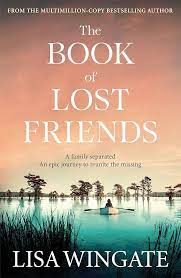The Book of Lost Friends Book Summary
“The Book of Lost Friends” by Lisa Wingate is a heartfelt novel that weaves together the lives of three remarkable women, each facing their challenges at different times. The narrative alternates between the Reconstruction era in Louisiana and more recent times in contemporary America.
In the Reconstruction era, we meet Hannie, a freed slave who is determined to find her family from whom she was separated during slavery. Hannie’s resilience and courage shine through as she embarks on a journey to reunite with her lost loved ones. The portrayal of Hannie’s character is both poignant and powerful, giving readers a glimpse into the harsh realities faced by those seeking their families after the Civil War.
Today, we are introduced to Benny Silva, a young teacher in a small Louisiana town. Benny discovers a connection to Hannie’s story while researching her family history. The parallel between the two women’s lives becomes a central theme, highlighting the enduring impact of history on the present. Benny’s character is relatable and endearing, making it easy for readers to empathize with her as she delves into the past to uncover the truth.
The narrative is enriched by including historical documents known as “Lost Friends” ads. These ads were published in newspapers by freed slaves searching for their relatives. Lisa Wingate seamlessly integrates these real-life ads into the fiction, adding authenticity and depth to the storytelling. The reader gets a glimpse of the challenges faced by those who sought to reconnect with their families amid the chaos of post-Civil War America.
One of the strengths of Wingate’s writing is her ability to create a vivid sense of time and place. Whether it’s the sweltering heat and humidity of the Reconstruction-era South or the quaint charm of a modern-day small town, the settings come alive on the pages. The author’s attention to detail allows readers to immerse themselves fully in the story, making the experience all the more engaging.
The theme of family and connection resonates throughout the novel. The importance of roots and the impact of history on individuals and communities are explored with sensitivity. As Hannie and Benny navigate their challenges, they discover the strength of understanding their pasts. The novel beautifully conveys that our stories are interconnected, transcending time and circumstance.
Wingate’s writing style is accessible and inviting. The prose flows smoothly, making it easy for readers to become engrossed in the narrative. The language is simple yet evocative, capturing the emotions of the characters and the essence of each moment. The author’s storytelling prowess is evident as she seamlessly blends history with fiction, creating an informative and emotionally resonant narrative.
“The Book of Lost Friends” also touches on themes of education and the power of knowledge. Benny’s role as a teacher adds depth to the story, emphasizing the transformative potential of education in shaping individuals and communities. Through her journey, Benny discovers the value of preserving and sharing stories, recognizing that the past holds lessons that can shape the future.
As the novel unfolds, readers will find themselves drawn into a tale of resilience, hope, and the enduring bonds of family. Wingate skillfully navigates between timelines, creating a narrative that unfolds organically. The pacing is well-balanced, ensuring the reader remains invested in both Hannie and Benny’s stories.
The characters in “The Book of Lost Friends” are multi-dimensional and relatable. Hannie’s determination, Benny’s curiosity, and the supporting cast of characters contribute to the richness of the narrative. The author explores the complexities of human relationships, portraying the struggles and the moments of joy that define these connections.
In conclusion, “The Book of Lost Friends” is a compelling and emotionally resonant novel that seamlessly blends history with fiction. Lisa Wingate’s storytelling prowess shines through as she crafts a narrative that explores themes of family, resilience, and the enduring impact of history. Through the journeys of Hannie and Benny, the novel reminds us of the importance of understanding our past and the connections that bind us across time. This book lingers in the heart, leaving a lasting impression on those who embark on this literary journey.
